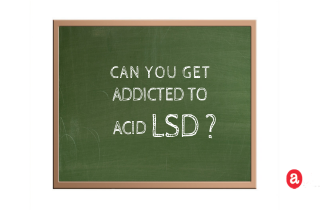No. Acid is not considered an addictive drug.
Unlike other recreational drugs, acid generally does not produce compulsive drug-seeking behaviors in those who use LSD. How long does acid stay in your system? Up to 5 days after dosing. However, it is possible to develop a tolerance to acid, which require larger and larger doses to experience hallucinations.
But does acid have long term health effects? Do you need to take it repeatedly to experience negative effects, or is just one hit enough? We explore in more detail below.
Psychoactive ingredients of acid
Acid is the street name for lysergic acid diethylamide, or LSD. Acid is a synthetic drug and is manufactured from lysergic acid – a substance which occurs naturally in ergot fungus on wheat and rye. LSD was first discovered in 1938, and has been manufactured, used and abused since the 1960s for its hallucinogenic effects.
Acid is usually sold as a liquid, or applied to blotter paper, sugar cubes, candy, or gelatin squares. It is also sometimes taken as a tablet or capsule. Acid is taken by mouth and is odorless and colorless.
Acid and the brain
The main effects of acid are seen in the brain and spinal cord. Acid alters a user’s perception of reality, causing them to see images, hear sounds, and experience sensations which are outside of ordinary perception. This altered state of consciousness occurs when LSD disrupts the interactions between nerve cells and the chemical serotonin, a neurotransmitter.
In large enough doses, acid produces delusions and visual hallucinations. These hallucinations may be frightening and causepanic and anxiety, sometimes severe. Most acid “trips” last about 12 hours.
Other dangers of acid use
LSD can affect each user differently. The risk of negative effects increases with larger doses of the drug. However, the effects of acid vary widely and there’s no reliable way to guess how acid will affect a particular individual.
Acid users can also experience “flashbacks” where they re-experience parts of a previous acid trip, sometimes years later. This can be a traumatic and unpleasant experience. LSD use can also trigger permanent psychological problems, including schizophrenia and depression.
Is it possible to become addicted to acid?
Research shows that most LSD users voluntarily discontinue or decrease use over time. So, medical professionals don’t believe it’s possible to become addicted, per se, to acid. No withdrawal effects have been noted upon cessation of LSD dosing. However, tolerance to LSD can eventually develop, leading to riskier behaviors and higher doses.
Although there is little information on the frequent, repeated use of the drug because such use is extremely rare…some people may require help to stay off LSD and/or other psychoactive substances. To learn more about the dangers of acid use as well as available rehab options, see what it’s like to seek help from LSD Addiction Treatment Programs and be better prepared for what you can expect. Help is available NOW!
Questions about LSD use and addiction
Do you have any other questions about using acid and its addiction liability? Please leave your questions below or send us an email. We attempt to respond to all questions about LSD and acid personally and promptly.









Related Posts